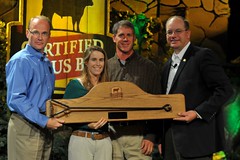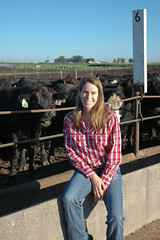In my never ending search for knowledge, I look to scientists to help me understand complex topics. While I recognize that as a “layman” I will never completely understand the details, visiting with experts helps me to gain a good general understanding. This enables me to make educated decisions in my daily life. One of the best perks of working as a volunteer consultant outside of my farm is the opportunity to meet scientists who work in a myriad of subjects involving beef production.
As a mother of three girls, it is especially fun for me when the scientist is a confident and articulate young woman who holds all of the traits of a great mentor. Dr. Kim Stackhouse-Lawson spent some time sharing with us last spring explaining the topic of sustainability as it relates to raising beef. She is back this week visiting with us on the topic of food waste and its role in the journey of continuous improvement.
Anne: What have you done personally in your life to improve your “food waste footprint”?
Kim: Reducing food waste is important to me and my husband. Cooking for two is sometimes challenging due to portion sizes that are available in grocery stores so we get creative with “left-over” recipes, which are becoming more and more popular and are easy to find online. My favorite beef leftover recipe is beefy sweet potato hash for breakfast, on beefitswhatfordinner.com. Another thing we do is raise backyard chickens. We have three Rhode Island Reds. We call them the “grandma chickens” because we named them after our grandmothers: Georgia, Carol, and Gaylean. They eat all of our food waste from preparing meals. Just this week I made tacos, so there was waste including stems from cilantro and avocado skins.
Anne: Can you please (as a scientist) speak to the topic of food waste relative to beef sustainability and the life cycle assessment? What role does it play in reducing the footprint of beef?
Kim: Food waste is an area where with small changes we, as society, can make a huge difference in sustainability. Approximately, 30-40% of our food is wasted in the U.S. resulting in a $161 billion dollar loss. The concern for me about food waste is not just monetary – it is environmental, and at a minimum we are wasting 2/3 of our natural resources on food that we waste. That is irresponsible. Beef is wasted much less than other foods, at 20%, but if we could reduce that waste by half we could improve the sustainability of beef production 10%.
Anne: What further research needs to be done relative to the topic of food waste?
Kim: The most pressing issues around food waste are communicating with consumers that it is a concern and teaching everyone ways they can help reduce waste – from backyard chickens that produce eggs, to more frequent trips to the grocery store, to left-over recipes – we all can help reduce food waste, help the planet and save money!
Anne: What further research needs to be done in order to accurately denote beef’s footprint relative to sustainability?
Kim: The science underpinning sustainability is quite new and while there has been tremendous progress made to better understand sustainability – like the beef industry’s comprehensive beef life cycle assessment – there are still a lot of unknowns, especially related to the unintended consequences of food production. For example, life cycle assessments aren’t comprehensive enough to capture the benefits of open space, improved water quality, wildlife habitat, land use change (from pasture to row crop), use of marginal lands for food production, or native grassland health – to name a few– all of which are dependent on the beef industry. In other words, we can’t yet quantify in a sustainability metric the whole food system as it relates to beef.
I look forward to continuing to follow Kim’s progress as she develops ideas for reducing waste in the beef production system, as well as further determining beef’s environmental footprint…












Pingback: Monkey In the Middle… | Feed Yard Foodie